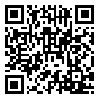

Volume 15, Issue 2 (7-2017)
RBS 2017, 15(2): 261-268 |
Back to browse issues page
Download citation:
BibTeX | RIS | EndNote | Medlars | ProCite | Reference Manager | RefWorks
Send citation to:



BibTeX | RIS | EndNote | Medlars | ProCite | Reference Manager | RefWorks
Send citation to:
موسوی س غ, کرمی ا, ابراهیمی ا, طاهرزاده ا. A Comparative Study of the Concept of Wisdom in Islamic, Psychological, and Psychiatric Resources. RBS 2017; 15 (2) :261-268
URL: http://rbs.mui.ac.ir/article-1-540-en.html
URL: http://rbs.mui.ac.ir/article-1-540-en.html
Abstract: (2611 Views)
Aim and Background: The concept of wisdom and its other equivalents have an important place in Islamic sciences, psychology, and psychiatry because of their determining roles in human health. Therefore, The present study explained and compared this concept in these three resources. Methods and Materials: In this was a review study, after looking up the word "wisdom" in the Arabic, Persian, and English dictionaries, and Quranic Arabic Corpus, the concept was extracted from the perspective of Islamic philosophers, Imams, the Quran, and academic textbooks of psychiatry and psychology. Finally, the common features and points and differences of the concept in the mentioned resources were described. Findings: Wisdom can be described in three perspectives. The Islamic literature has divided wisdom into theoretical and practical and described it as judgment power, preventer of deviation and corruption, the basis of human personality, and a human appraisal criterion in the hereafter. Psychiatry has defined wisdom as having true insight into the self, one’s disorders, and correct judgment in various conditions. In psychological literature, the concept of wisdom is the ability to think and practice based on knowledge, experience, and correct insight. Conclusions: All three resources believe in the gradual evolution of wisdom and consider various factors affecting this evolution. However, in the Islamic view, the concept of the hereafter, as an important and essential concept, has different approaches and perspectives.
Type of Study: Research |
Subject:
General
Received: 2020/02/8 | Accepted: 2017/07/15 | Published: 2017/07/15
Received: 2020/02/8 | Accepted: 2017/07/15 | Published: 2017/07/15
| Rights and permissions | |
 |
This work is licensed under a Creative Commons Attribution-NonCommercial 4.0 International License. |



